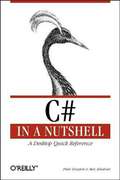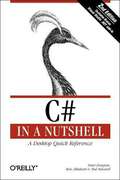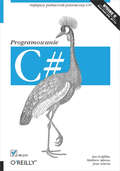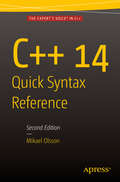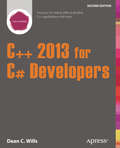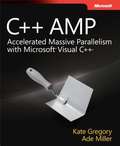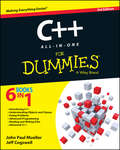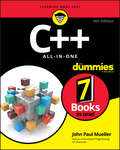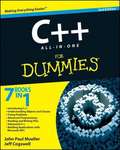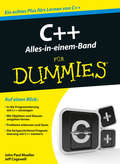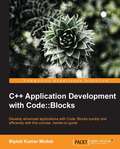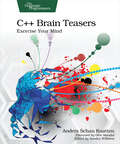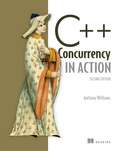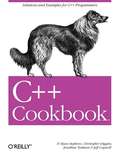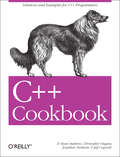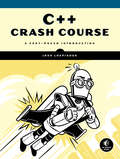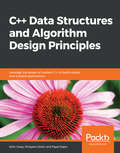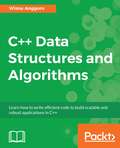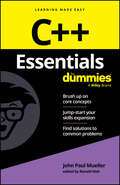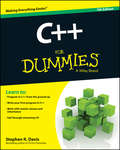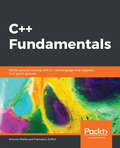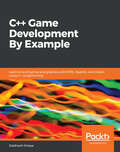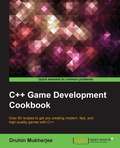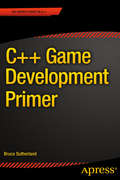- Table View
- List View
C# in a Nutshell
by Ben Albahari Peter Drayton Ted NewardC# in a Nutshell provides everything programmers need to know about the C# language in one concise and accessible volume. Designed as a primary reference for daily use, it also includes all the essential background information to become productive quickly. Not a "how-to" book or a rehash of Microsoft's documentation, this book goes to the source of the C# language and the APIs of the .NET Framework to present the content in a way that professional programmers will value above all other books. Brief introductions to the language and .NET runtime provide the needed preparation for programming with the C# language, whose keywords and syntax are then detailed in subsequent chapters. Next, C# in a Nutshell presents key namespaces and types of the .NET Framework base class library which provides much of the functionality and power of the language. Using C# examples, the .NET Framework covers each core area, including: Strings Collections XML Networking Input/Output Serialization Assemblies Reflection Custom Attributes Memory Management Threading Integrating with Native DLLs Integrating with COM Components Diagnostics Determined to provide even more value, C# in a Nutshell moves into a comprehensive language reference, plus syntax, XML documentation tags, naming and coding conventions, and the various C# development tools--the kind of reference material programmers will use every day. Next, an extensive and quick reference to the API is presented, featuring the System namespace. Particularly useful are the many figures and tables that present the main features of the namespace. For those looking create alternatives to Microsoft's implementation of the C# Programming Language and the Common Language Infrastructure as submitted to ECMA (an international standards organization), each element included in the ECMA submission is clearly labeled. Finally, the entire reference is based on Version 1 of the .NET Framework and generated by tools written in the C# language itself. Every once in a while, a book becomes the de-facto standard for a technology, operating system, or programming language--which is exactly what C# in a Nutshell aims to do in a single straightforward and easy to use volume.
C# in a Nutshell, 2nd Edition
by Ben Albahari Peter Drayton Ted NewardC# in a Nutshell provides C# programmers with a concise and thorough reference to the language in one straightforward and accessible volume. Designed as a handbook for daily use, this book is an essential guide to the C# language and the base class APIs of the .NET Framework. Programmers will want to keep this book next to their keyboards for years to come. The heart of the book is a succinct but detailed reference to the C# language and the .NET types most essential to C# programmers. Each chapter in the API reference begins with an overview of a .NET namespace and a diagram of its types, including a quick-reference entry for each type, with name, assembly, category, description, member availability, class hierarchy, and other relevant information, such as whether the type is part of the ECMA CLI specification. Newly updated for .NET Framework version 1.1, the second edition also adds a CD that allows you to integrate the book's API Quick Reference directly into the help files of Visual Studio .NET 2002 and 2003, giving you direct access to this valuable information via your computer. In addition to the API reference section, this book includes: An accelerated introduction to the C# language and the .NET Common Language Runtime A tutorial section on using C# with the core classes of the .NET Framework Class Library to perform common tasks such as manipulating strings, I/O, and interacting with legacy components Comprehensive language and tool reference chapters, including a C# syntax summary, a list of XML documentation tags, and a guide to command-line tools that ship with Visual Studio .NET and the .NET Framework Appendixes with reference tables for regular expression syntax, format specifiers, a C# keyword glossary, namespace/assembly cross-reference, and a type and member index for determining in which type a method or field is defined. Every once in a while, a book becomes the de facto standard for a technology, operating system, or programming language--which is exactly what C# in a Nutshell has done in a single straightforward and easy to use volume. There is no more complete, up-to-date reference to the C# Language available.
C#. Programowanie. Wydanie VI
by Matthew Adams Jesse Liberty Ian GriffithsNajlepszy podr?cznik po?wi?cony C#!W dzisiejszych czasach szczególnš popularno?ciš cieszš si? j?zyki programowania pozwalajšce na pisanie kodu ?atwego do przenoszenia mi?dzy platformami, poniewa? nikt nie ma czasu na pisanie kilku wersji jednej aplikacji. C# to uniwersalny j?zyk, który bez trudu spe?nia ten wymóg. Dzi?ki swej elastyczno?ci, wydajno?ci oraz mocnemu wsparciu spo?eczno?ci zdoby? on uznanie programistów. Jego wybór to strza? w dziesištk?!Ten bestsellerowy podr?cznik pozwoli Ci b?yskawicznie pozna? wszystkie niuanse j?zyka C# 4.0. Najnowsze wydanie zosta?o zaktualizowane o nowo?ci w C# oraz zawiera opis tego j?zyka i platformy .NET. W trakcie lektury nauczysz si? tworzy? skomplikowane programy przy u?yciu technik programowania obiektowego i funkcjonalnego. Ponadto sprawdzisz, jaki potencja? kryje j?zyk zapyta? LINQ oraz jak przesy?a? komunikaty za pomocš Windows Communication Foundation (WCF). Dodatkowo poznasz mo?liwo?ci C# w zakresie tworzenia aplikacji internetowych w technologii Silverlight. Nauka C# jeszcze nigdy nie by?a tak przyjemna!Pisz z?o?one programy z u?yciem technik programowania obiektowego oraz funkcjonalnegoPrzetwarzaj du?e kolekcje danych dzi?ki wbudowanym w j?zyk zapytaniom LINQKomunikuj si? przez sie? za pomocš Windows Communication Foundation (WCF)Poznaj zalety technik programowania dynamicznego, dost?pnych w C# 4.0Twórz interaktywne aplikacje Windows z Windows Presentation Foundation (WPF)Twórz bogate aplikacje internetowe z wykorzystaniem mo?liwo?ci Silverlight oraz ASP.NETWykorzystaj potencja? j?zyka C#!Ian Griffiths jest autorem kursu WPF oraz instruktorem w firmie Pluralsight, specjalizujšcej si? w prowadzeniu kursów Microsoft .NET. Pracuje tak?e jako niezale?ny konsultant. Jest wspó?autorem ksiš?ek "Windows Forms in a Nutshell", "Mastering Visual Studio .NET" oraz "Programming WPF", wydanych przez wydawnictwo O"Reilly.Matthew Adams jest kierownikiem do spraw tworzenia aplikacji w firmie Digital Healthcare Ltd. oraz autorem wielu artyku?ów i publikacji dotyczšcych znaczenia .NET w przemy?le informatycznym.Jesse Liberty jest starszym kierownikiem programu Microsoft Silverlight. Jest doskonale znany w ?rodowisku jako jeden z czo?owych ekspertów oraz autor bestsellerowych ksiš?ek, takich jak "Programming C# 3.0" (O"Reilly) oraz "ASP.NET 3.5. Programowanie" i "ASP.NET 2.0 i Ajax".
C++ 14 Quick Syntax Reference: Second Edition
by Mikael OlssonThis updated handy quick C++ 14 guide is a condensed code and syntax reference based on the newly updated C++ 14 release of the popular programming language. It presents the essential C++ syntax in a well-organized format that can be used as a handy reference. You won't find any technical jargon, bloated samples, drawn out history lessons, or witty stories in this book. What you will find is a language reference that is concise, to the point and highly accessible. The book is packed with useful information and is a must-have for any C++ programmer. In the C++ 14 Quick Syntax Reference, Second Edition, you will find a concise reference to the C++ 14 language syntax. It has short, simple, and focused code examples. This book includes a well laid out table of contents and a comprehensive index allowing for easy review. What you'll learn How to create a C++ HelloWorld How to compile and run What are C++ variables, operators, pointers and references What are arrays, strings, conditionals, loops and more How to write functions How to work with constructors, inheritance, overridings How to use access levels, static, enum, string and union, and more What are custom conversions, namespaces, constants, and preprocessors How to do event handling What are type conversions, templates, headers, and more Who this book is for This book is a quick, handy pocket syntax reference for experienced C++ programmers, and a concise, easily-digested introduction for other programmers new to C++. Table of Contents 1. HelloWorld 2. Compile and Run 3. Variables 4. Operators 5. Pointers 6. References 7. Arrays 8. String 9. Conditionals 10. Loops 11. Functions 12. Class 13. Constructor 14. Inheritance 15. Overriding 16. Access Levels 17. Static 18. Enum 19. String and Union 20. Operator Overloading 21. Custom Conversions 22. Namespaces 23. Constants 24. Preprocessor 25. Event Handling 26. Type Conversions 27. Templates 28. Headers
C++ 2013 for C# Developers
by Dean C. WillsC++ 2013 for C#yDevelopers provides a fast-track to C++ proficiency forthose already using the C# language at an advanced level. Beginning with a detailed explanation of the mechanics of C++'s execution sequence, its grammar, syntax and data access you'll quickly learn the similarities and differences between C++ and C#. The second and third partsof the of the book are devoted to a detailed deep-dive into C++ development to provide clear information and advice about how to use the languageeffectively. "
C++ AMP: Accelerated Massive Parallelism with Microsoft® Visual C++®
by Ade Miller Kate Gregory<p>Capitalize on the faster GPU processors in today’s computers with the C++ AMP code library—and bring massive parallelism to your project. With this practical book, experienced C++ developers will learn parallel programming fundamentals with C++ AMP through detailed examples, code snippets, and case studies.</p>
C++ All-in-One For Dummies
by Jeff Cogswell John Paul MuellerGet ahead of the C++ curve to stay in the game C++ is the workhorse of programming languages and remains one ofthe most widely used programming languages today. It'scross-platform, multi-functional, and updates are typicallyopen-source. The language itself is object-oriented, offering youthe utmost control over data usage, interface, and resourceallocation. If your job involves data, C++ proficiency makes youindispensable.C++ All-in-One For Dummies, 3rd Edition is yournumber-one handbook to C++ mastery. Author John Paul Mueller is arecognized authority in the computer industry, and your ultimateguide to C++. Mueller takes you through all things C++, includinginformation relevant to the 2014 update.Learn how to work with objects and classesConquer advanced programming and troubleshootingDiscover how lambda expressions can make your code more conciseand readableSee Standard Library features, such as dynamic arrays, inactionOnline resources include source code from examples in the bookas well as a C++ GNU compiler. If you need to learn C++, this isthe fastest, most effective way to do it. C++ All-in-One ForDummies, 3rd Edition will get you up and running quickly, soyou can get to work producing code faster and better than ever.
C++ All-in-One For Dummies
by John Paul MuellerGet ready for C++20 with all you need to know for complete mastery! Your comprehensive and updated guide to one of the world’s most popular programming languages is here! Whether you’re a novice or expert, you’ll find what you need to get going with the latest features of C++20. The workhorse of programming languages, C++ gives you the utmost control of data usage and interface and resource allocation. If your job involves data, proficiency in C++ means you’re indispensable! This edition gives you 8 books in 1 for total C++ mastery. Inside, internationally renowned expert John Paul Mueller takes you from the fundamentals of working with objects and classes to writing applications that use paradigms not normally associated with C++, such as those used for functional programming strategies. The book also includes online resources such as source code. You discover how to use a C++ GNU compiler to build applications and even how to use your mobile device for coding. Conquer advanced programming and troubleshooting Streamline your code with lambda expressions Use C++ where you need it: for gaming, enterprise applications, and Web services Uncover object secrets including the use of design patterns Discover how to use functional programming techniques to make code concise and easy to read If you want to be your organization’s C++ guru, C++ All-In-One for Dummies is where it’s at!
C++ All-in-One For Dummies, 2nd Edition
by Jeff Cogswell John Paul MuellerHere's the easy way to learn how to use C++ C++, developed by Bjarne Stroustrup at Bell Labs, is one of the most widely used programming languages, with close to four million C++ programmers and growing. C++'s popularity has earned it a spot as part of the Standard Library. Fully updated for the new C++ 2009 standard, C++ All-in-One for Dummies, 2nd Edition compiles seven books into one. This guidebook covers key topics like an introduction to C++, understanding objects and classes, fixing problems, advanced programming, reading and writing files, advanced C++, and building applications with Microsoft MFC. If you're a C++ newbie, start with Book I. But if you're experienced with C++, simply jump in anywhere to learn more! This all-in-one reference helps you learn to: Use C++ for Windows, Mac, and Linux by using the CodeBlocks compiler Understand object-oriented programming Use various diagrams to design your programs Recognize how local variables are stored Use packages, notes, and tags effectively Make a class persistent Handle constructors and destructors With over 25,000 sold of the previous bestselling edition, this second edition with a bonus CD makes C++ easier to understand. It's a perfect introduction for new programmers and guide for advanced programmers. Note: CD-ROM/DVD and other supplementary materials are not included as part of eBook file.
C++ Alles in einem Band für Dummies (Für Dummies)
by John Paul Mueller Jeffrey M. CogswellDieses Buch ist für alle, die tief in die C++-Programmierung einsteigen möchten. Dennoch werden keine Programmierkenntnisse vorausgesetzt. John Paul Mueller und Jeff Cogswell erklären Ihnen zunächst, wie Sie C++ installieren. Sie erfahren, was Klassen und Objekte sind, was Sie mit Entwurfsmustern anfangen und wie Sie Ihre Programme debuggen. Aus Anfängern werden Entwickler mit Erfahrung und dann fortgeschrittene Programmierer. Diese finden in diesem Buch Informationen zu dynamischen Arrays, Lambda-Ausdrücken, Streams, UML, der Standardbibliothek, zu Boost und vielem mehr. Alle Codebeispiele des Buchs stehen zum Download zur Verfügung.
C++ Application Development with Code::Blocks
by Biplab Kumar ModakThis is a comprehensive tutorial with step-by-step instructions on how to develop applications with Code::Blocks.This book is for C++ developers who wish to use Code::Blocks to create applications with a consistent look and feel across multiple platforms. This book assumes that you are familiar with the basics of the C++ programming language.
C++ Brain Teasers: Exercise Your Mind
by Anders Schau KnattenC++ is famous for getting all the default behaviors wrong and for sometimes making demons fly out of your nose. Through 25 puzzles, from the useful to the outright weird, we explore some of C++'s most interesting quirks. How does initialization actually work? Do temporaries even exist? Why is `+!!"" ` a valid expression in C++? As you work through each puzzle, you will peel off some of the layers of complexity of C++, getting a fundamental understanding of how the language works. This will help you write better code and recognize issues more easily while debugging. Each puzzle in the book is a complete, seemingly simple C++ program, but can you figure out the output for each, or will the answers stump you? Most of the programs compile and have deterministic, though sometimes surprising, output. Some might, however, have undefined behavior, where anything can happen, including making demons fly out of your nose! Yet others might have unspecified behavior with output that is not completely deterministic; we just know nothing as bad as nasal demons will happen. All puzzles are accompanied by detailed discussions, taking a look under the hood at what exactly is going on to help you understand more about C++'s unexpected behaviors, as well as fundamental concepts like initialization, overload resolution, and implicit conversions. For the non-deterministic cases, we'll explore some typical behaviors one can expect to see in practice, what causes them, and why they shouldn't be relied on. After working through the book, you'll have tools and techniques to help you write better and safer code, and a better understanding of the fundamentals of the language, the background for some of C++'s apparent weirdness, and a better feel for identifying bugs and unsafe code in your own programs. What You Need: The book assumes basic knowledge of C++. If you want to run the programs yourself, you can use either a local C++ compiler or the online compilers at https://godbolt.org.
C++ Concurrency in Action
by Anthony WilliamsSummaryThis bestseller has been updated and revised to cover all the latest changes to C++ 14 and 17! C++ Concurrency in Action, Second Edition teaches you everything you need to write robust and elegant multithreaded applications in C++17.Purchase of the print book includes a free eBook in PDF, Kindle, and ePub formats from Manning Publications.About the TechnologyYou choose C++ when your applications need to run fast. Well-designed concurrency makes them go even faster. C++ 17 delivers strong support for the multithreaded, multiprocessor programming required for fast graphic processing, machine learning, and other performance-sensitive tasks. This exceptional book unpacks the features, patterns, and best practices of production-grade C++ concurrency.About the BookC++ Concurrency in Action, Second Edition is the definitive guide to writing elegant multithreaded applications in C++. Updated for C++ 17, it carefully addresses every aspect of concurrent development, from starting new threads to designing fully functional multithreaded algorithms and data structures. Concurrency master Anthony Williams presents examples and practical tasks in every chapter, including insights that will delight even the most experienced developer. What's insideFull coverage of new C++ 17 featuresStarting and managing threadsSynchronizing concurrent operationsDesigning concurrent codeDebugging multithreaded applicationsAbout the ReaderWritten for intermediate C and C++ developers. No prior experience with concurrency required.About the AuthorAnthony Williams has been an active member of the BSI C++ Panel since 2001 and is the developer of the just::thread Pro extensions to the C++ 11 thread library.Table of ContentsHello, world of concurrency in C++!Managing threadsSharing data between threadsSynchronizing concurrent operationsThe C++ memory model and operations on atomic typesDesigning lock-based concurrent data structuresDesigning lock-free concurrent data structuresDesigning concurrent codeAdvanced thread managementParallel algorithmsTesting and debugging multithreaded applications
C++ Cookbook
by Jeff Cogswell Christopher Diggins Ryan Stephens Jonathan TurkanisDespite its highly adaptable and flexible nature, C++ is also one of the more complex programming languages to learn. Once mastered, however, it can help you organize and process information with amazing efficiency and quickness. The C++ Cookbook will make your path to mastery much shorter. This practical, problem-solving guide is ideal if you're an engineer, programmer, or researcher writing an application for one of the legions of platforms on which C++ runs. The algorithms provided in C++ Cookbook will jump-start your development by giving you some basic building blocks that you don't have to develop on your own. Less a tutorial than a problem-solver, the book addresses many of the most common problems you're likely encounter--whether you've been programming in C++ for years or you're relatively new to the language. Here are just some of the time-consuming tasks this book contains practical solutions for: Reading the contents of a directory Creating a singleton class Date and time parsing/arithmetic String and text manipulation Working with files Parsing XML Using the standard containers Typical of O'Reilly's "Cookbook" series, C++ Cookbook is written in a straightforward format, featuring recipes that contain problem statements and code solutions, and apply not to hypothetical situations, but those that you're likely to encounter. A detailed explanation then follows each recipe in order to show you how and why the solution works. This question-solution-discussion format is a proven teaching method, as any fan of the "Cookbook" series can attest to. This book will move quickly to the top of your list of essential C++ references.
C++ Cookbook
by Jeff Cogswell Christopher Diggins Ryan Stephens Jonathan TurkanisDespite its highly adaptable and flexible nature, C++ is also one of the more complex programming languages to learn. Once mastered, however, it can help you organize and process information with amazing efficiency and quickness. The C++ Cookbook will make your path to mastery much shorter. This practical, problem-solving guide is ideal if you're an engineer, programmer, or researcher writing an application for one of the legions of platforms on which C++ runs. The algorithms provided in C++ Cookbook will jump-start your development by giving you some basic building blocks that you don't have to develop on your own. Less a tutorial than a problem-solver, the book addresses many of the most common problems you're likely encounter--whether you've been programming in C++ for years or you're relatively new to the language. Here are just some of the time-consuming tasks this book contains practical solutions for: Reading the contents of a directory Creating a singleton class Date and time parsing/arithmetic String and text manipulation Working with files Parsing XML Using the standard containers Typical of O'Reilly's "Cookbook" series, C++ Cookbook is written in a straightforward format, featuring recipes that contain problem statements and code solutions, and apply not to hypothetical situations, but those that you're likely to encounter. A detailed explanation then follows each recipe in order to show you how and why the solution works. This question-solution-discussion format is a proven teaching method, as any fan of the "Cookbook" series can attest to. This book will move quickly to the top of your list of essential C++ references.
C++ Cookbook: Solutions and Examples for C++ Programmers
by Jeff Cogswell Christopher Diggins Jonathan Turkanis D. Ryan StephensDespite its highly adaptable and flexible nature, C++ is also one of the more complex programming languages to learn. Once mastered, however, it can help you organize and process information with amazing efficiency and quickness.The C++ Cookbook will make your path to mastery much shorter. This practical, problem-solving guide is ideal if you're an engineer, programmer, or researcher writing an application for one of the legions of platforms on which C++ runs. The algorithms provided in C++ Cookbook will jump-start your development by giving you some basic building blocks that you don't have to develop on your own. Less a tutorial than a problem-solver, the book addresses many of the most common problems you're likely encounter--whether you've been programming in C++ for years or you're relatively new to the language. Here are just some of the time-consuming tasks this book contains practical solutions for:Reading the contents of a directoryCreating a singleton classDate and time parsing/arithmeticString and text manipulationWorking with filesParsing XMLUsing the standard containers Typical of O'Reilly's "Cookbook" series, C++ Cookbook is written in a straightforward format, featuring recipes that contain problem statements and code solutions, and apply not to hypothetical situations, but those that you're likely to encounter. A detailed explanation then follows each recipe in order to show you how and why the solution works. This question-solution-discussion format is a proven teaching method, as any fan of the "Cookbook" series can attest to. This book will move quickly to the top of your list of essential C++ references.
C++ Crash Course: A Fast-Paced Introduction
by Josh LospinosoA fast-paced, thorough introduction to modern C++ written for experienced programmers. After reading C++ Crash Course, you'll be proficient in the core language concepts, the C++ Standard Library, and the Boost Libraries.C++ is one of the most widely used languages for real-world software. In the hands of a knowledgeable programmer, C++ can produce small, efficient, and readable code that any programmer would be proud of.Designed for intermediate to advanced programmers, C++ Crash Course cuts through the weeds to get you straight to the core of C++17, the most modern revision of the ISO standard. Part 1 covers the core of the C++ language, where you'll learn about everything from types and functions, to the object life cycle and expressions. Part 2 introduces you to the C++ Standard Library and Boost Libraries, where you'll learn about all of the high-quality, fully-featured facilities available to you. You'll cover special utility classes, data structures, and algorithms, and learn how to manipulate file systems and build high-performance programs that communicate over networks. You'll learn all the major features of modern C++, including:Fundamental types, reference types, and user-defined typesThe object lifecycle including storage duration, memory management, exceptions, call stacks, and the RAII paradigm Compile-time polymorphism with templates and run-time polymorphism with virtual classesAdvanced expressions, statements, and functionsSmart pointers, data structures, dates and times, numerics, and probability/statistics facilitiesContainers, iterators, strings, and algorithmsStreams and files, concurrency, networking, and application developmentWith well over 500 code samples and nearly 100 exercises, C++ Crash Course is sure to help you build a strong C++ foundation.
C++ Data Structures and Algorithm Design Principles: Leverage the power of modern C++ to build robust and scalable applications
by John Carey Shreyans Doshi Payas RajanGet started with C++ programming by learning how to build applications using its data structures and algorithms Key Features Explore data structures such as arrays, stacks, and graphs with real-world examples Study the trade-offs between algorithms and data structures and discover what works and what doesn't Discover how techniques such as bloom filters and multi-way heaps boost real-world applications Book Description C++ is a mature multi-paradigm programming language that enables you to write high-level code with a high degree of control over the hardware. Today, significant parts of software infrastructure, including databases, browsers, multimedia frameworks, and GUI toolkits, are written in C++. This book starts by introducing C++ data structures and how to store data using linked lists, arrays, stacks, and queues. In later chapters, the book explains the basic algorithm design paradigms, such as the greedy approach and the divide-and-conquer approach, which are used to solve a large variety of computational problems. Finally, you will learn the advanced technique of dynamic programming to develop optimized implementations of several algorithms discussed in the book. By the end of this book, you will have learned how to implement standard data structures and algorithms in efficient and scalable C++ 14 code. What you will learn Build applications using hash tables, dictionaries, and sets Explore how modern hardware affects the actual run-time performance of programs Apply common algorithms such as heapsort and merge sort for string data types Use C++ template metaprogramming to write code libraries Implement a URL shortening service using a bloom filter Use appropriate modern C++ idioms such as std:: array instead of C-style arrays Who this book is for This book is for developers or students who want to revisit basic data structures and algorithm design techniques. Although no mathematical background is required, basic knowledge of complexity classes and Big O notation along with a qualification in an algorithms course will help you get the most out of this book. Familiarity with C++ 14 standard is assumed.
C++ Data Structures and Algorithms: Learn how to write efficient code to build scalable and robust applications in C++
by Wisnu AnggoroLearn how to build efficient, secure and robust code in C++ by using data structures and algorithms - the building blocks of C++Key FeaturesUse data structures such as arrays, stacks, trees, lists, and graphs with real-world examplesLearn the functional and reactive implementations of the traditional data structuresExplore illustrations to present data structures and algorithms, as well as their analysis, in a clear, visual mannerBook DescriptionC++ is a general-purpose programming language which has evolved over the years and is used to develop software for many different sectors. This book will be your companion as it takes you through implementing classic data structures and algorithms to help you get up and running as a confident C++ programmer.We begin with an introduction to C++ data structures and algorithms while also covering essential language constructs. Next, we will see how to store data using linked lists, arrays, stacks, and queues. Then, we will learn how to implement different sorting algorithms, such as quick sort and heap sort. Along with these, we will dive into searching algorithms such as linear search, binary search and more. Our next mission will be to attain high performance by implementing algorithms to string datatypes and implementing hash structures in algorithm design. We'll also analyze Brute Force algorithms, Greedy algorithms, and more.By the end of the book, you'll know how to build components that are easy to understand, debug, and use in different applications.What you will learnKnow how to use arrays and lists to get better results in complex scenariosBuild enhanced applications by using hashtables, dictionaries, and setsImplement searching algorithms such as linear search, binary search, jump search, exponential search, and moreHave a positive impact on the efficiency of applications with tree traversalExplore the design used in sorting algorithms like Heap sort, Quick sort, Merge sort and Radix sortImplement various common algorithms in string data typesFind out how to design an algorithm for a specific task using the common algorithm paradigmsWho this book is forThis book is for developers who would like to learn the Data Structures and Algorithms in C++. Basic C++ programming knowledge is expected.
C++ Essentials For Dummies
by John Paul MuellerThe quick and crystal-clear guide to C++ programming C++ Essentials For Dummies is your useful reference to the key concepts of C++, the popular general-purpose language utilized everywhere from building games to writing parts of operating systems. With minimal review and background material—and absolutely no fluff—this book gets straight to the essential topics you need to know to ramp up, brush up, or level up. Get a helpful intro to the basic concepts of coding in C++ Review what you already know or pick up essential new skills Create projects that run smoothly with the C++ language Keep this concise reference book handy for jogging your memory as you work Great for supplementing classroom learning, reviewing for a certification, or staying knowledgeable on the job, C++ Essentials For Dummies is a fantastic refresher guide that you can always turn to for answers.
C++ For Dummies
by Stephen R. DavisEnter the world of computer programming with this step-by-step guide to the C++ language! C++ is a great introduction to object-oriented programming, and this friendly guide covers everything you need to know and nothing you don't. You'll write your first program by the end of Chapter 1.C++ For Dummies, 6th Edition, helps you understand C++ programming from the ground up. It's full of examples to show you how things work, and it even explains "why", so you understand how the pieces fit together. And the bonus CD includes a special code editor, an update GNU compiler, and all source code from the book to save you time.Learn programming lingo and what terms like object-oriented, compiler, and executable mean, so you can write a program right awaySee how to bundle sections of your code into modules that can be reused in different programsWork with features of object-oriented programming such as classes, constructors, and destructorsDiscover how the concept of inheritance is the key to effective C++ programmingWork with assignment operators, stream I/O, and other more advanced concepts, once you've grasped the basicsYou'll discover ten ways to avoid adding bugs to your programs, what pointers are and how to use them, how to work with strings, and some advanced features new to C++. C++ For Dummies, 6th Edition gets you up and running with this popular object-oriented language.Note: CD-ROM/DVD and other supplementary materials are not included as part of eBook file.
C++ Fundamentals: Hit the ground running with C++, the language that supports tech giants globally
by Francesco ZoffoliThis book is for professional developers who want to learn a new, powerful language; and students who are ready to enter into the industry. Software developers familiar with older C++ standards, who want to update their knowledge to the modern paradigms of C++11, C++14 and C++17, are also welcome. This book is aimed at anyone passionate about programming, and who is ready to grasp a powerful yet complex language.
C++ Game Development By Example: Learn to build games and graphics with SFML, OpenGL, and Vulkan using C++ programming
by Siddharth ShekarExplore modern game programming and rendering techniques to build games using C++ programming language and its popular libraries Key Features Learn how you can build basic 2D and complex 3D games with C++ Understand shadows, texturing, lighting, and rendering in 3D game development using OpenGL Uncover modern graphics programming techniques and GPU compute methods using the Vulkan API Book Description Although numerous languages are currently being used to develop games, C++ remains the standard for fabricating expert libraries and tool chains for game development. This book introduces you to the world of game development with C++. C++ Game Development By Example starts by touching upon the basic concepts of math, programming, and computer graphics and creating a simple side-scrolling action 2D game. You'll build a solid foundation by studying basic game concepts such as creating game loops, rendering 2D game scenes using SFML, 2D sprite creation and animation, and collision detection. The book will help you advance to creating a 3D physics puzzle game using modern OpenGL and the Bullet physics engine. You'll understand the graphics pipeline, which entails creating 3D objects using vertex and index buffers and rendering them to the scene using vertex and fragment shaders. Finally, you'll create a basic project using the Vulkan library that'll help you get to grips with creating swap chains, image views, render passes, and frame buffers for building high-performance graphics in your games. By the end of this book, you'll be ready with 3 compelling projects created with SFML, the Vulkan API, and OpenGL, and you'll be able take your game and graphics programming skills to the next level. What you will learn Understand shaders and how to write a basic vertex and fragment shader Build a Visual Studio project and add SFML to it Discover how to create sprite animations and a game character class Add sound effects and background music to your game Grasp how to integrate Vulkan into Visual Studio Create shaders and convert them to the SPIR-V binary format Who this book is for If you're a developer keen to learn game development with C++ or get up to date with game development, this book is for you. Some knowledge of C++ programming is assumed.
C++ Game Development Cookbook
by Druhin MukherjeeThis book is ideal for aspiring game developers who are proficient in C++ programming and are interested in developing games with C++. Some basic knowledge of game programming will be useful but is not necessary.
C++ Game Development Primer
by Bruce SutherlandC++ is the language behind most of today's computer games. This 96-page C++ Game Development Primer takes you through the accelerated process of writing games for otherwise experienced C++ programmers. After reading this book, you'll have the fundamental know-how to become a successful and profitable game applications developer in today's increasingly competitive indie game marketplace. For those looking for a quick introduction to C++ game development and who have good skills in C++, this will get you off to a fast start. C++ Game Development Primer is based on Learn C++ for Game Development by the same author, giving you the essentials to get started in game programming without the unnecessary introduction to C++. What you'll learn How to write C++ games using object-oriented programming techniques How to work with design patterns in C++ game development How to apply C++ to native game activities How to build an actual game project Who this book is for This book is for aspiring game developers with previous C++ programming experience who want to build game applications. Table of Contents 1. Managing Memory for Game Development 2. Useful Design Patterns for Game Development 3. Using File IO to Save and Load Games 4. Speeding Up Games with Concurrent Programming 5. Supporting Multiple Platforms in C++ 6. Wrapping Up with a Game Project Case Study
